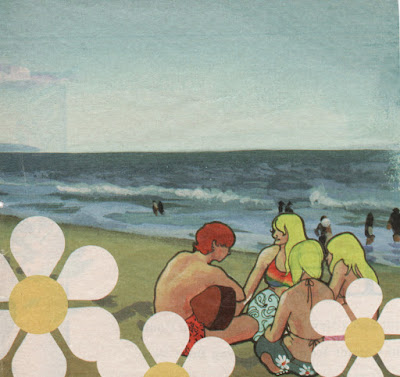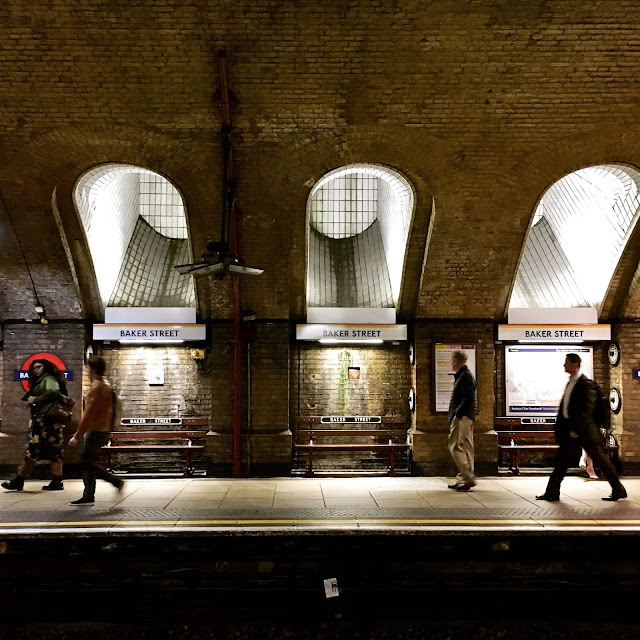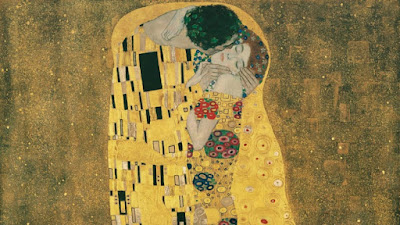#11 BEACH MUSIC: A time of tans, blonds and hot pants
IT WAS A TIME OF TANS, BLONDS AND HOT PANTS, WHEN THE ENDLESS SUMMER WAS JUST A SHORT WALK DOWN A HOT SIDEWALK
Beach Music, originally published in the Los Angeles Times Sunday Magazine, is really a tale of two cities: San Juan, Puerto Rico and Santa Monica, California. File it under On the Street Where I Live
Beach Music
We came to California from Canada, with a detour to Puerto Rico that lasted one endless summer of a year. A year in which I turned 15, and my hair turned blond from living in the sun.
“Psst,” the boys and men would call after me in the blue-cobbled streets of San Juan. “Psst! Hey, blondie. Psst! Hey, cutie pie.”
I was devastated when my parents said we had to go, that it was time to leave the island so that my older brother, Russell, could get a first rate education.
The plan was to drive cross country from Miami and settle in San Francisco so that my brother could finish high school before going on to UC Berkeley. But, once we got there in the fall of 1968, we found that while the city was undeniably beautiful, we simply couldn’t take the cold. After one short year in Paradise, we’d grown accustomed to beach-kissed legs, fried plantains and coconut ice cream. The notion of trading warmth for woolen sweaters, sourdough bread and lobster bisques didn’t appeal.
So, late in October, after spending a grim month at a Lombard Street motel, the gray seeping under our skin, we headed south and drove until we reached, what my father called, the megalopolis of Los Angeles. When Lincoln Boulevard’s ugliness -- one of L.A.’s few eternals -- seemed unending, we stopped in our tracks. “South takes us to the airport,” my father murmured, consulting a map. “It can only get worse. Shall we go back a bit then and try Santa Monica?”
Whatever. We all wanted out of the car.
We checked into the Kensington Motel because it was a cheap place to stay while my parents looked for an apartment. It was a seedy little spot, with its washed-out paint peeling in the sun like a bad sunburn and its kitchenette odor of boiled potatoes. A plastic sign out front boasted a color television in every room, and in the courtyard there was a tiny oval pool. But by the time we’d changed into swimsuits, a dozen midgets in Speedos had beat us to the water, playing Marco Polo, splashing each other and doing cannonballs off the sides. For my sister, Nancy, who at ten, trembled at the mere sight of a clown or department store Santa, the idea of cavorting with the circus boys was way too creepy. Instead, we took a wooden stairway leading to an alley, and from there we found our way to the beach.
Crossing the wide swathe of sand, we noticed it was a little scratchy under our bare feet, and once we reached the shoreline, we were shocked by the coldness of the water, although the weather was Indian Summer mild. But if we were thinking that back in San Juan the beach sand was like baby powder and the water was always warm, we didn’t voice it. Not out loud.
Sitting on towels and feigning cool disinterest, we watched as groups of high school girls ran past us, legs muscling in their blue shorts, feet sinking deep into the sand. They all looked beautiful - still brown in October, the white gleam of their smiles matching their white gym blouses, their long straight hair whipping out behind them like kite strings. From sandy beiges to cool champagnes, golden wheats to palest pearls, I couldn’t help but notice how many blonds there were, running west from where Santa Monica High School sat squatting like a giant on the hill, down Pico Boulevard to the beach, up to the pier and back. So very many blonds on such a big beach.
Back in San Juan, my friends and I had spent our weekends cruising. We’d check out the tourist boys at the beach, their pink noses coated with zinc oxide, their pale blue Oxford button-downs opened over polished chests and new baggies. Running in from the beach, we’d check out fresh white towels from the local guys working as hotel pool boys, caramel-skinned surfers we knew from around, with their sun-bleached hair and puka shells and muy macho surf knobs on their knees and ankles. We used hotels -- La Concha, the Condado-- as if they were our private country clubs, racing back and forth between la playa and the pool bars, perching on stools, singing out, “Coka, por favor.”
We thought we were pretty glamorous with our mini sundresses slipped over bikinis, swinging our bare brown legs from bar stools, feet shoeless except for “sandals” made from a piece of string looped around an ankle and toe, a felt daisy holding it together. “There is someone walking behind you. Turn around, look at me” and other Top 40 stateside hits blasting over the loudspeaker. The smell of Coppertone in the air. Names like Emilio and Rogelio and Edwardo softly slipping off our tongues.
That first day on the beach in Santa Monica - a beach, I noticed with a stab of disappointment, unadorned by hotel umbrellas or beach-side bars where we could grab a Coka and papas fritas - I could see things would be quite different. Here I would be just one of a thousand sunny blonds, and there wasn’t a surf shack or a coconut palm in sight.
In Puerto Rico at St. John’s Episcopal Cathedral School, all 200 of us, from kindergartners to 12th-graders, fit under one prettily tiled roof off the Avenida Ponce de Leon. I’d even been a cheerleader for the fledgling football team and a writer on the tiny mimeographed school paper.
In Santa Monica, almost 3,000 kids swarmed over the behemoth campus at Samohi, and I spent the first month of lunches hiding in a restroom stall rather than pass through the crowded quad to eat, ignored and invisible in the cafeteria. I waited for a teacher to ask me if I liked to write. I didn’t know that in a student body of 3,000, you can’t wait to be asked.
For awhile, I hung out after school with Rosa, who lived in my building. She taught me how to heat tortillas on the gas burner, and sometimes I’d sit alongside her in the front seat of her boyfriend’s low rider, Latin music blaring out the windows as we went cruising down Lincoln to shop for discos Latinos, Rosa translating snippets of what Miguel was saying. I couldn’t believe my year in Puerto Rico had left me so utterly mono-lingual.
I was pretty miserable until, by sheer coincidence, my friend Laura moved from Canada too. Suddenly life was like an AM station - all fun, all the time. Together we made up code names for the boys we liked and cruel nicknames for the girls we simultaneously envied and hated. In the era of newly relaxed dress codes, we sewed patches on our jeans and went braless under homemade string tops. We also wrote lots of terrible poetry in hardback ledgers that we carried everywhere in case the muse arrived.
We ditched school a few times, including the day the Sylmar earthquake hit, early one February morning of our senior year. My dad had dropped us at the Pico gate and we had walked in, noted the cracks on the history building and walked right out the back way. We hit the beach where, using a kazoo, we smoked a joint my brother had sold us for the hefty price of $5. Later we discovered that the marijuana had been nothing more than oregano. We’d been too busy laughing to know if we were high or not.
During the summer, Laura and I would walk from 14th and Wilshire to the beach almost every day, checking out our reflections in the storefront windows, grooving on the sound of our huaraches flapping against the sidewalk. I loved the way the ground glass in the cement sparkled like a zillion tiny diamonds.
On the way home we’d stop at the A&W for a root beer float and maybe a Mama burger, and we’d talk about whatever guys had or hadn’t tried to pick us up at the beach that day. Sometimes we’d stop at the old 3rd Street mall to shop and hang out. One day, these older, surfer-type guys in Hawaiian shirts told us they were the Beach Boys. “Right,” we thought cynically. We dismissed them as quickly as we did any guy whose hair was too short or who was stupid enough to try the lame pick up line: “What’s there to do around here?” Around here? We’d look at them as if they were overgrown insects. What could there possibly be to do on the mall? The place was a dead zone. “What this town needs are some sidewalk cafes,” we’d moan, disgusted with our sleepy beach town’s lack of action. “That would make it really cool.”
Cool? What did we know from cool? It was 1971. Our hair was long and sun-drenched, and we slathered on iodine and baby oil because you could never be too tanned. Underneath our graduation gowns we wore hot pants and knee-high boots and didn’t even know, had absolutely no clue, that all those songs about California Girls were about us.
NOTE: The 3rd Street Mall is now the 3rd Street Promenade in Santa Monica. It has plenty of sidewalk cafes.
The LA Times ran the illustration by Hiroko Tsuji
when they published ‘Beach Music’ in their Sunday Magazine.
•••••••••••••••••••••
If you enjoyed this you might want to read #9 Of Brasso and Brownies about life before we moved to Puerto Rico.



